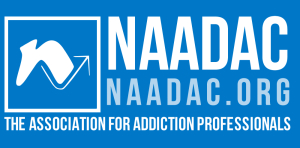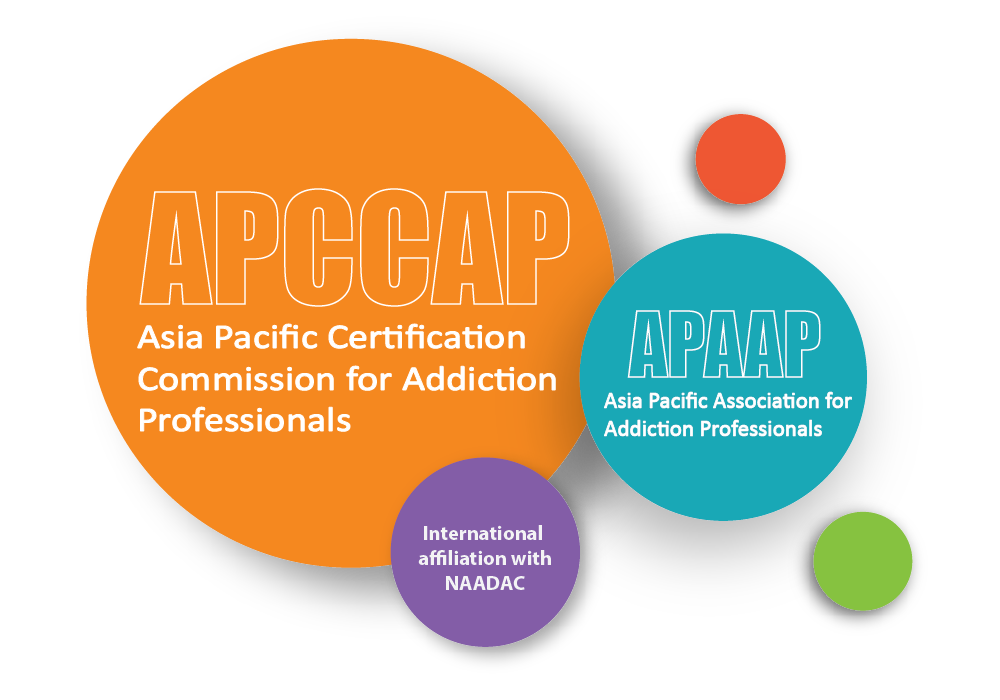


 Founding Supporter:
Founding Supporter:




 Founding Supporter:
Founding Supporter:


Tung Wah Group of Hospitals (TWGHs) has accumulated extensive experiences in treatment of a range of addiction problems. With the mission to promote development of addiction specialists and to formally recognize addiction counselors who meet international standards in Asia Pacific regions, TWGHs has set up Asia Pacific Association for Addiction Professionals (APAAP) and Asia Pacific Certification Commission for Addiction Professionals (APCCAP).
APAAP is an affiliate organization of the U.S. National Association for Alcoholism and Drug Abuse Counselors (NAADAC) and is the exclusive affiliate for Mainland China, Hong Kong SAR and Macau SAR.
While TWGHs has been granted the Approved Education Provider (AEP) status by NAADAC to offer professional training and continuing education towards certifications in Addiction Counselor, APAAP will partner with NAADAC to review and approve all AEP applications in Mainland China, Hong Kong SAR and Macau SAR. All interest parties from the above regions should first submit their AEP applications to APAAP.
The aims of developing the Asia Pacific Association for Addiction Professionals (APAAP) are to promote and develop the addiction profession through a membership system which is to support sharing of profession interests in Asia Pacific region. APAAP?™s members are addiction counselors, educators and other addictionÂfocused health care professionals, who specialize in addiction prevention, treatment, recovery support and education.
Duties of the Asia Pacific Association for Addiction Professionals (APAAP):
Members of the APAAP Board are appointed based on their expertise in the field of addiction. The members are from a diverse background such as medical, social welfare and legal backgrounds.
Ms CHUNG Yin-ting, Brenda, B.A., M.S.W., R.S.W., Master Addiction Counsellor, Member of MINT
Senior Section Manager (Youth and Family Services), Tung Wah Group of Hospitals
Mr. WONG Hing-yan, Ryan, B.S.S., M.S.W., R.S.W., Senior Addiction Counsellor
Supervisor, Even Centre, Tung Wah Group of Hospitals
Finance & Supplies Division, Tung Wah Group of Hospitals
Dr. WONG Fung-yee, Margaret, B.S.W., M.Soc. Sc., M.A., R.S.W., Exe Management Prog. (Harvard), D.S.W.
Head of Department, Department of Social Work, Hong Kong Shue Yan University
Mr. Luwig NG, LLB (Hons), PCLL, LLM
Senior Partner, ONC Lawyers
Dr. YIU Yuk-kwan, MBBS (HK), FHKCFP, FRACGP, FHKAM (Family Medicine)
Chief of Service, Department of Family Medicine & Primary Health Care, Hospital Authority
Dr. LO Kin-ming, Camilla, B.A., M.S.W., R.S.W., Ph.D., NCAC II
Associate Professor, Department of Applied Social Sciences, The Hong Kong Polytechnic University
Dr. NGAI Kee-hung, Chris
Advanced Practice Nurse (Psychiatric), Pamela Youde Nethersole Eastern Hospital Substance Abuse Clinic, Hospital Authority
In Hong Kong, addiction treatment services are mainly provided by health care and helping professionals such as social workers, counselors, nurses, medical doctors, occupational therapists, psychiatrists, and psychologists in in the following settings: outpatient centers, residential treatment centers, hospitals, individual and family services, government, psychiatric units, substance abuse clinics, and private practice. The emergence of APAAP and APCCAP is hoping to bring these professionals together and establish a community for knowledge exchange and professional networking in order to propel advancement in addiction treatment and prevention. APAAP and APCCAP also advocate recognizing addiction counseling as a stand-alone specialty as treatment of substance use disorders and other addiction problems involves multidisciplinary practice and requires specialized skills and knowledge.
Addiction Counselors certified by APCCAP possess a level of education competency which includes experience of skills and knowledge related to addiction prevention and intervention. Those who wish to become a Certified Addiction Counselor please visit Certification Procedures and Examination (Link).
While the Asia Pacific Association for Addiction Professionals (APAAP) is to promote development of the addiction profession through establishing a membership system, the Asia Pacific Certification Commission for Addiction Professionals (APCCAP) is to monitor the competence of those who treat addictions through providing standardized testing for credentialing. APAAP and APCCAP have an independent governance and leadership. Two organizations work closely together to ensure addiction professions are receiving training and to be acknowledged credential.
The following Code of Ethics is appliable to the members of APAAP and Addiction Counselors certified by APPCAP. The below ethical standards are adopted from NAADAC with permission.
It is the responsibility of the addiction professional to safeguard the integrity of the counseling relationship and to ensure that the client is provided with beneficial services. The client will be provided access to effective treatment and referral giving consideration to individual educational, legal and financial needs. Addiction professionals also recognize their responsibility to the larger society and any specific legal obligations that may, on limited occasions, supersede loyalty to clients.
The addiction professional shall provide the client and/or guardian with accurate and complete information regarding the extent of the professional relationship. In all areas of function, the addiction professional is likely to encounter individuals who are vulnerable and exploitable. In such relationships he or she seeks to nurture and support the development of a relationship of equals rather than to take unfair advantage. In personal relationships, the addiction professional seeks to foster self-sufficiency and healthy self-esteem in others. In relationships with clients he or she provides only that level and length of care that is necessary and acceptable.
The addiction professional uses assessment instruments as one component of the counseling/treatment and referral process taking into account the client?™s personal and cultural background. The assessment process promotes the well-being of individual clients or groups. Addiction professionals base their recommendations/reports on approved evaluation instruments and procedures. The designated assessment instruments are ones for which reliability has been verified by research.
Addiction professionals shall provide information to clients regarding confidentiality and any reasons for releasing information in adherence with confidentiality laws. When providing services to families, couples or groups, the limits and exceptions to confidentiality must be reviewed and a written document describing confidentiality must be provided to each person. Once private information is obtained by the addiction professional, standards of confidentiality apply. Confidential information is disclosed when appropriate with valid consent from a client or guardian. Every effort is made to protect the confidentiality of client information, except in very specific cases or situations.
The addiction professional espouses objectivity and integrity and maintains the highest standards in the services provided. The addiction professional recognizes that effectiveness in his or her profession is based on the ability to be worthy of trust. The professional has taken time to reflect on the ethical implications of clinical decisions and behavior using competent authority as a guide.
Further, the addiction professional recognizes that those who assume the role of assisting others to live a more responsible life take on the ethical accountability of living responsibly. The addiction professional recognizes that even in a life well-lived, harm might be done to others by words and actions. When he or she becomes aware that any work or action has done harm, he or she admits the error and does what is possible to repair or ameliorate the harm except when to do so would cause greater harm. Professionals recognize the many ways in which they influence clients and others within the community and take this fact into consideration as they make decisions in their personal conduct.
An addiction professional understands the significance of the role that ethnicity and culture plays in an individual?™s perceptions and how he or she lives in the world. Addiction professionals shall remain aware that many individuals have disabilities which may or may not be obvious. Some disabilities are invisible and unless described might not appear to inhibit expected social, work and health care interactions. Included in the invisible disabled category are those persons who are hearing impaired, have a learning disability, have a history of brain or physical injuries and those affected by chronic illness. Persons having such limitations might be younger than age 65. Part of the intake and assessment must then include a question about any additional factor that must be considered when working with the client.
The addiction professional recognizes that the profession is founded on national standards of competency which promote the best interests of society, the client, the individual addiction professional and the profession as a whole. The addiction professional recognizes the need for ongoing education as a component of professional competency and development.
Addiction professionals who supervise others accept the obligation to facilitate further professional development of these individuals by providing accurate and current information, timely evaluations and constructive consultation. Counseling supervisors are aware of the power differential in their relationships with supervisees and take precautions to maintain ethical standards. In relationships with students, employees and supervisees he/she strives to develop full creative potential and mature independent functioning.
The addiction professional shall behave in accordance with legal, ethical and moral standards for his or her work. To this end, professionals will attempt to resolve ethical dilemmas with direct and open communication among all parties involved and seek supervision and/or consultation as appropriate.
The addiction professional who submits for publication or prepares handouts for clients, students or for general distribution shall be aware of and adhere to copyright laws.
The addiction professional is strongly encouraged to the best of his or her ability, to actively engage the legislative processes, educational institutions and the general public to change public policy and legislation to make possible opportunities and choice of service for all human beings of any ethnic or social background whose lives are impaired by alcoholism and drug abuse.
The Youth & Family Services Section of Tung Wah Group of Hospitals Community Services Division provides administrative support to APAAP and APCCAP.
Asia Pacific Association for Addiction Professionals and
Asia Pacific Certification Commission for Addiction Professionals
15/F Tung Chiu Commercial Centre, 193-197 Lockhart Road
Wan Chai, Hong Kong
Telephone: (+852) 2827-1408
Fax: (+852) 2877-9559
Email: icapt@tungwah.org.hk